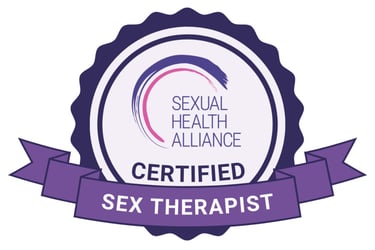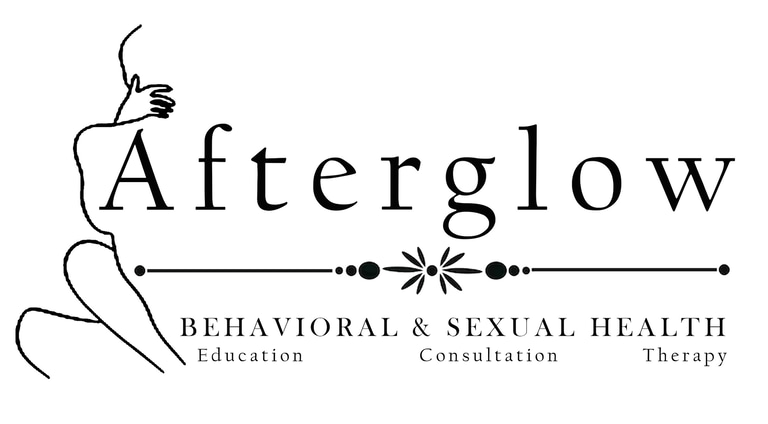Sexual Health Support for People Living in Larger Bodies
Every Body is Deserving of Pleasure


At Afterglow Behavioral and Sexual Health, we know that living in a larger body often comes with an added burden—one that isn’t physical, but emotional. Shame, stigma, and silence around weight and sexuality often leave people feeling excluded from conversations about pleasure, desire, and intimacy.
Living in a larger body is not just about a number on a scale or the size on a clothing tag—it’s about how comfortable someone feels in their skin, particularly when it comes to intimacy and pleasure. A 2021 study in Sexual and Relationship Therapy found that body image satisfaction was a significantly stronger predictor of sexual functioning and enjoyment than BMI, with participants reporting that feeling desirable and emotionally connected contributed more to satisfying sex than physical size. Despite this, societal messages often equate larger bodies with undesirability, creating internalized shame that undermines confidence and sexual expression. According to the Journal of Obesity (2019), 58% of adults in larger bodies avoid sexual activity due to fear of judgment or discomfort with their appearance, not due to physical limitations. At Afterglow, we support the truth that a healthy and satisfying sex life is not determined by weight—it’s defined by self-trust, communication, embodiment, and the freedom to feel good in your body, exactly as it is.
You may have been told—directly or indirectly—that your body is “too much,” “not attractive,” or “needs to change” before it can be sexual. We reject that narrative completely. You deserve to feel good in your body now—not just “someday.”
And at Afterglow, we’re here to help you reclaim your right to connection, confidence, and joy.
When Weight Stigma Impacts Sexual Health
Weight stigma has a significant and often underrecognized impact on sexual health. Research from the Journal of Obesity (2019) found that individuals who experienced weight-based discrimination were 25% more likely to report avoidance of sexual activity, regardless of actual body size. This avoidance is often fueled by internalized shame, fear of rejection, and negative self-perception—factors that directly reduce sexual desire, responsiveness, and satisfaction. In another study published in Body Image (2021), nearly 70% of participants in larger bodies reported feeling less sexually desirable due to societal weight bias, and this perception was strongly linked to lower self-esteem and decreased arousal during partnered sex. Importantly, these effects are not physiological but psychological, rooted in how individuals are treated and how they come to view themselves within a weight-stigmatizing culture.
The medical system often compounds this issue. A study in Obesity Reviews (2020) found that 48% of healthcare providers admit to holding negative attitudes about patients in larger bodies, which can lead to the dismissal of sexual health concerns or attributing all issues to weight. As a result, many individuals report avoiding sexual health discussions altogether, contributing to unmet needs and untreated dysfunction. Yet research shows that when body diversity is affirmed and individuals are supported in cultivating body acceptance, sexual satisfaction and frequency significantly improve—even without any change in weight (Journal of Sex Research, 2022). Addressing weight stigma isn't about promoting weight loss; it’s about removing shame-based barriers to pleasure, intimacy, and care. Programs like Afterglow’s Wabi-Sabi Body approach offer a compassionate, nonjudgmental space to restore sexual confidence and connection, grounded in respect for every body, exactly as it is.
Sexual challenges aren’t always about hormones or technique—they’re often deeply rooted in how we feel in our own skin. Living in a larger body, you may experience:
Difficulty relaxing during intimacy due to body image or self-consciousness
Avoidance of sex or dating because of shame or fear of rejection
Disconnection from desire due to years of body criticism or trauma
Pain or discomfort in certain positions or activities
Anxiety about being fully seen, touched, or undressed
Internalized messages that sexual pleasure must be “earned” through weight loss
These experiences are real—and they’re more common than you think. You are not alone. And you don’t have to navigate these struggles in silence.
Healing from the Inside Out
Healing from the inside out begins by addressing the internalized shame and self-criticism that many people in larger bodies carry—often before they've even had the chance to explore their sexual identities or desires. A 2020 study in Body Image found that individuals who practiced self-compassion were 54% more likely to report satisfaction with their sexual experiences, regardless of their weight or physical health status. Unlike externally focused approaches that prioritize appearance, internal healing reframes the body as a source of experience and connection rather than judgment. When individuals shift from body surveillance (how they look) to embodied awareness (how they feel), they open the door to increased desire, arousal, and responsiveness. In fact, research published in Sexual Medicine (2018) showed that body appreciation—not BMI—was the strongest predictor of sexual satisfaction across genders and age groups.
This inside-out approach is especially important in a culture where larger bodies are routinely marginalized, both socially and medically. A 2021 report from the Journal of Counseling Psychology found that over 60% of women and 40% of men in larger bodies avoid sexual intimacy due to body-related anxiety, despite reporting desire for connection. These patterns of avoidance often stem from years of exposure to stigmatizing messages and limited access to body-affirming care. However, when individuals engage in therapeutic frameworks that center internal validation, such as Afterglow’s Wabi-Sabi Body model, they report significant improvements in sexual self-esteem and intimacy within just a few months. Healing from the inside out is not about earning intimacy through weight change—it’s about reclaiming pleasure, presence, and confidence from within, regardless of size.
Afterglow was founded to be a safe place for people who have been marginalized, minimized, or made to feel invisible in traditional healthcare settings. Our clinicians are trained in:
Size-inclusive and fat-positive approaches
LGBTQ+ affirming care
Trauma-informed sexual health
Shame resilience and body image work
Partner dynamics around weight stigma and sexual avoidance
We welcome all bodies—soft bodies, round bodies, big bodies, changing bodies—and we see the beauty in every one of them.
The Wabi-Sabi Body™: Honoring Imperfect, Beautiful Wholeness
The Wabi-Sabi Body™ framework, developed by Dr. Kent in 2014 and practiced at Afterglow Behavioral and Sexual Health, embraces imperfection, change, and authenticity as the foundation for self-acceptance and sexual confidence—especially for individuals in larger bodies. In a culture that pressures people to earn intimacy through appearance, The Wabi-Sabi Body™ approach reframes bodies not as projects to perfect, but as evolving, worthy vessels of experience. Research from the Journal of Sex Research (2022) found that body appreciation, not weight or shape, was the strongest predictor of sexual satisfaction, even among those who reported long-term body image struggles. By emphasizing presence, sensual awareness, and emotional connection over performance or aesthetics, Dr. Kent’s The Wabi-Sabi Body™️ model helps individuals reconnect with their natural erotic potential without shame. This internal shift fosters not only more pleasurable sexual experiences, but also a more resilient sense of self in and out of the bedroom.
Living in a larger body often comes with external stigma and internalized beliefs that dampen sexual expression. A 2020 study published in Body Image showed that individuals in size-inclusive, body-affirming therapeutic environments were 42% more likely to report increased sexual confidence and reduced anxiety about physical intimacy. The Wabi-Sabi Body™ framework, created by Dr. Kent, facilitates this transformation by guiding clients to honor their bodies as they are—not as they’re expected to be—while helping them reclaim the sensual and sexual parts of themselves that have often been suppressed or silenced. Through compassionate exploration, sensory reconnection, and values-based intimacy goals, Afterglow’s The Wabi-Sabi Body™ process supports the cultivation of sexual confidence rooted in authenticity, not appearance. This empowers individuals in larger bodies to redefine intimacy on their own terms, leading to deeper connection, increased pleasure, and sustainable sexual wellbeing.
We help you:
See your body not as a project, but as a partner
Cultivate sensuality beyond visual standards of beauty
Access intimacy as a form of self-connection, not just performance
Understand that sexual confidence doesn’t come after body acceptance—it’s part of how we build it
What We Offer at Afterglow
At Afterglow, weight-inclusive, body-affirming care means every client is seen as more than a number on a scale. This approach is grounded in research showing that weight stigma, not weight itself, is a major barrier to overall and sexual well-being. A 2022 study in The Lancet Public Health found that individuals experiencing weight stigma were 2.5 times more likely to avoid preventive healthcare—including sexual health screenings—due to fear of judgment or mistreatment. Furthermore, according to the Journal of Sex Research (2021), body shame is a stronger predictor of low sexual satisfaction than BMI, with up to 68% of adults in larger bodies reporting that shame directly interferes with intimacy and desire. At Afterglow, we reject the narrative that bodies must be “fixed” to be sexually empowered, and instead affirm that pleasure, confidence, and connection are accessible at every size.
By honoring the whole person—mind, body, and sexual self—Afterglow’s weight-inclusive model invites clients to rebuild trust in their bodies without centering weight loss. Our The Wabi-Sabi Body™ framework draws on body neutrality, self-compassion, and mindful sensuality, creating space for individuals to reclaim pleasure, intimacy, and agency. A 2020 study published in Health Psychology found that clients in body-affirming care settings experienced 40% lower levels of anxiety and higher engagement in health-promoting behaviors, including sexual exploration and communication. At Afterglow, healing isn’t about conformity—it’s about curiosity, authenticity, and wholeness. We believe that when people feel emotionally safe, physically respected, and sexually affirmed, lasting transformation happens from the inside out—regardless of body size. Our team helps clients of all sizes:
Rebuild sexual self-esteem
Reduce shame and performance anxiety
Explore intimacy and pleasure in ways that feel safe, empowering, and real
Learn adaptive and comfortable sexual positions
Address the emotional pain of weight-based rejection or trauma
Rekindle connection in relationships affected by body image struggles
You don’t have to lose weight to gain intimacy. You only need the freedom to stop apologizing for your body.

Get More Informatin or Schedule Today
Connect with us
© 2025. All rights reserved.
dr.kent.sexhealth@gmail.com


